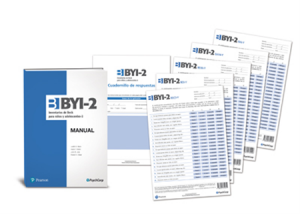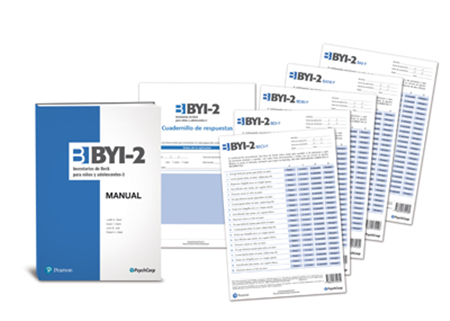[:es]
 Pearson Clínical y AITANA han colaborado en la adaptación española de los inventarios de Beck para niños y adolescentes-2 (BYI-2). Este instrumento evalúa de forma sencilla y breve el malestar psicológico en niños y adolescentes. Cada uno de los cinco cuestionarios que lo comprenden está formado por 20 afirmaciones sobre pensamientos, sentimientos o conductas relacionadas con trastornos emocionales y sociales en niños y adolescentes.
Pearson Clínical y AITANA han colaborado en la adaptación española de los inventarios de Beck para niños y adolescentes-2 (BYI-2). Este instrumento evalúa de forma sencilla y breve el malestar psicológico en niños y adolescentes. Cada uno de los cinco cuestionarios que lo comprenden está formado por 20 afirmaciones sobre pensamientos, sentimientos o conductas relacionadas con trastornos emocionales y sociales en niños y adolescentes.
El inventario de depresión de Beck para niños y adolescentes (BDI-Y) evalúa los pensamientos negativos del niño o del adolescente sobre sí mismo, su vida y su futuro; los sentimientos de tristeza e indicaciones fisiológicas de depresión. El inventario de ansiedad (BAI-Y) evalúa los miedos y preocupaciones del niño o del adolescente así como síntomas físicos asociados a la ansiedad. El inventario de ira de Beck para niños y adolescentes (BANI-Y) evalúa la percepción de recibir un trato injusto, pensamientos negativos sobre los demás, sentimientos de ira y activación fisiológica. El inventario de conducta disruptiva (BDBI-Y) evalúa conductas y actitudes asociadas con trastornos disruptivos, el control de los impulsos y de la conducta. Por último, el inventario de autoconcepto (BSCI-Y) evalúa la percepción que el niño o el adolescente tiene de sí mismo respecto a las competencias, la fortaleza y la autoestima. En el panel de asesores españoles ha participado el profesor José Pedro Espada, investigador principal de AITANA. Toda la información sobre la prueba pueden consultarse en http://www.pearsonclinical.es/producto/137/byi-2–inventarios-de-beck-para-ninos-y-adolescentes-2
[:en]
 Pearson Clinical and AITANA have collaborated in the Spanish adaptation of the Beck inventories for children and adolescents-2 (BYI-2). This instrument evaluates in a simple and brief way the psychological discomfort in children and adolescents. Each of the five questionnaires that comprise it consists of 20 statements about thoughts, feelings or behaviours related to emotional and social disorders in children and adolescents.
Pearson Clinical and AITANA have collaborated in the Spanish adaptation of the Beck inventories for children and adolescents-2 (BYI-2). This instrument evaluates in a simple and brief way the psychological discomfort in children and adolescents. Each of the five questionnaires that comprise it consists of 20 statements about thoughts, feelings or behaviours related to emotional and social disorders in children and adolescents.
The Beck Depression Inventory for Children and Adolescents (BDI-Y) evaluates the negative thoughts of the child or adolescent about himself, his life and his future; feelings of sadness and physiological indications of depression. The anxiety inventory (BAI-Y) evaluates the fears and concerns of the child or adolescent as well as physical symptoms associated with anxiety. Beck’s anger inventory for children and adolescents (BANI-Y) evaluates the perception of receiving unfair treatment, negative thoughts about others, feelings of anger and physiological activation. The Disruptive Behavior Inventory (BDBI-Y) evaluates behaviours and attitudes associated with disruptive disorders, impulse control and behaviour. Finally, the self-concept inventory (BSCI-Y) evaluates the perception that the child or adolescent has of himself regarding competencies, strength and self-esteem. In the panel of Spanish advisors, Professor José Pedro Espada, main researcher of AITANA, participated. All the information about the test can be consulted in http://www.pearsonclinical.es/producto/137/byi-2–inventarios-de-beck-para-ninos-y-adolescentes-2
[:]

